Obama Banking Reforms Maybe Too Little Too Late, Stock Market Nosedives
Stock-Markets / Financial Markets 2010 Jan 23, 2010 - 08:39 AM GMT It may be the right direction, but not nearly enough...
It may be the right direction, but not nearly enough...
President Barack Obama’s proposal to impose limits on may win him support on Main Street and shake up Wall Stcommercial banksreet without doing much to make the financial system safer overall. The plan, which is still lacking in details and must be approved by Congress, aims to make the banks more secure by forcing them to minimize the trading they do on their own account and give up their stakes in hedge funds and private equity firms. “It’s the right direction,” said Henry Kaufman, president of Henry Kaufman & Co. in New York and a former vice chairman of Salomon Inc.
…and maybe too late?
Markets nosedived on Thursday when Barack Obama set out broad new measures on financial regulation. The most significant of them is banning deposit-taking banks from proprietary trading that is “unrelated to serving customers”. This activity has generated politically incendiary profits for banks and bonuses for bankers. The timing was political: the president spoke on the day that Goldman Sachs announced fourth-quarter earnings of $4.95bn. Those of a more populist nature than Mr Obama – both on the left and on the right – will say that he comes late to the game.
The Recession is not over.
Economists may see the recession as being over, but the man on the street does not. Roughly 60% of the public believes the recession still has a way to go, a NBC/Wall Street Journal poll reported last October. Even those who have not suffered know someone—a friend, a neighbor, a family member—who is being hurt. Two in three say the rally in the stock market has not changed their views.
The uptrend is broken.
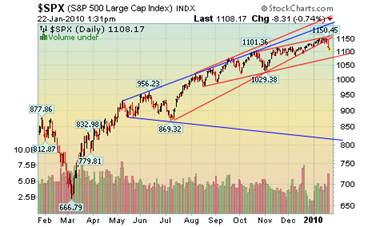 -- The uptrend in the S&P 500 Index was broken this week. There is a lot of backpedaling in Washington, which was all too ready to claim success as the market was rising, but asked us to ignore the last two day decline. The uptrend, which was technically “on the edge” since early December, has finally lost what is called trend support. Look for much lower prices ahead.
-- The uptrend in the S&P 500 Index was broken this week. There is a lot of backpedaling in Washington, which was all too ready to claim success as the market was rising, but asked us to ignore the last two day decline. The uptrend, which was technically “on the edge” since early December, has finally lost what is called trend support. Look for much lower prices ahead.
Obama’s proposals strengthened Treasuries.
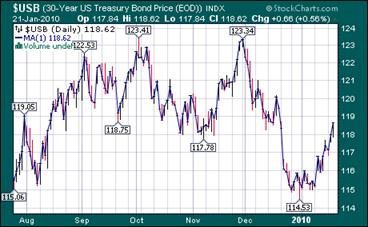 -- Treasuries headed for a third weekly gain as speculation that President Barack Obama’s bank- regulation plans will crimp economic growth weakened equities and added to demand for fixed-income securities. The yield on the 10-year note reached its lowest in a month after the Obama administration yesterday proposed to limit the size and trading activities of financial institutions as a way to prevent another systemic meltdown. The Treasury is scheduled to sell $118 billion in notes next week.
-- Treasuries headed for a third weekly gain as speculation that President Barack Obama’s bank- regulation plans will crimp economic growth weakened equities and added to demand for fixed-income securities. The yield on the 10-year note reached its lowest in a month after the Obama administration yesterday proposed to limit the size and trading activities of financial institutions as a way to prevent another systemic meltdown. The Treasury is scheduled to sell $118 billion in notes next week.
Gold’s decline ready to resume?
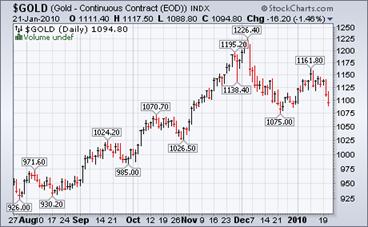 -- Gold may decline as a rebounding dollar curbs demand for the metal as an alternative investment, a survey showed. Twelve of 17 traders, investors and analysts surveyed by Bloomberg, or 71 percent, said bullion would fall next week. Four forecast higher prices and one was neutral. Gold for delivery in February was down 2.9 percent for this week at $1,097.70 an ounce at noon in New York yesterday.
-- Gold may decline as a rebounding dollar curbs demand for the metal as an alternative investment, a survey showed. Twelve of 17 traders, investors and analysts surveyed by Bloomberg, or 71 percent, said bullion would fall next week. Four forecast higher prices and one was neutral. Gold for delivery in February was down 2.9 percent for this week at $1,097.70 an ounce at noon in New York yesterday.
The Nikkei turns south.
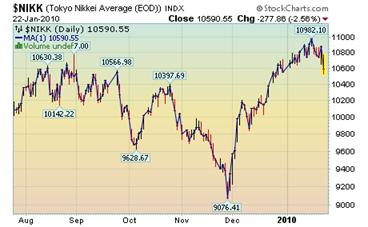 -- Japanese stocks slumped the most since November after the U.S. proposed to reduce risk-taking at banks and concern mounted that China will raise interest rates to curb inflation. The Nikkei 225 fell 2.6 percent to close at 10,590.55 in Tokyo, almost erasing this year’s gain. The broader Topix index slid 1.6 percent to 940.94, with six times as many stocks declining as advancing. Both gauges lost the most since Nov. 27.
-- Japanese stocks slumped the most since November after the U.S. proposed to reduce risk-taking at banks and concern mounted that China will raise interest rates to curb inflation. The Nikkei 225 fell 2.6 percent to close at 10,590.55 in Tokyo, almost erasing this year’s gain. The broader Topix index slid 1.6 percent to 940.94, with six times as many stocks declining as advancing. Both gauges lost the most since Nov. 27.
Shanghai isn’t immune to troubles, either.
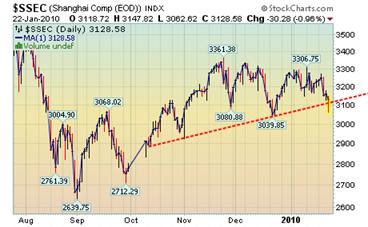 -- Investors pulled $348 million from China equity funds last week, the biggest outflow in 18 weeks, on concern China’s moves to cool its economy will slow growth, according to EPFR Global. Chinese stocks fell since the government this month started tightening monetary policy to curb record loan growth and prevent bubbles in the nation’s property and stock markets. Technically, the Shanghai Index violated a potential Head and Shoulders formation, which calls for a large decline. The bubble may be popped.
-- Investors pulled $348 million from China equity funds last week, the biggest outflow in 18 weeks, on concern China’s moves to cool its economy will slow growth, according to EPFR Global. Chinese stocks fell since the government this month started tightening monetary policy to curb record loan growth and prevent bubbles in the nation’s property and stock markets. Technically, the Shanghai Index violated a potential Head and Shoulders formation, which calls for a large decline. The bubble may be popped.
The dollar is showing bullish tendencies.
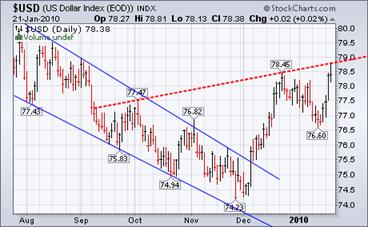 The dollar is poised for an upside breakout. The “line in the sand” in red is a technical pattern called a neckline of an inverted Head and Shoulders pattern. Tuesday’s election in Massachusetts is considered a change in the outlook of Washington to “dollar friendly.” In the past, Washington talked a good talk, but their actions were quite destructive to the dollar. The outlook may have reversed.
The dollar is poised for an upside breakout. The “line in the sand” in red is a technical pattern called a neckline of an inverted Head and Shoulders pattern. Tuesday’s election in Massachusetts is considered a change in the outlook of Washington to “dollar friendly.” In the past, Washington talked a good talk, but their actions were quite destructive to the dollar. The outlook may have reversed.
A safety net hides the risk of bank failure.
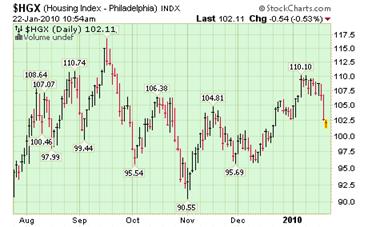 -- There is a fascinating phenomenon that occurs in the banking system when capital is running short. At least, this was the case before the government decided to be the ultimate financial backup for the entire banking structure of our country. Places like Washington Mutual or Countrywide were offering stellar rates on various savings vehicles only days before their demise. How can this be? Well for one, banks are allowed to chase public capital and realize that the public will put money into a bank so long as the FDIC backs up the bank. Unfortunately, if the bank fails the FDIC only covers your principal, not interest.
-- There is a fascinating phenomenon that occurs in the banking system when capital is running short. At least, this was the case before the government decided to be the ultimate financial backup for the entire banking structure of our country. Places like Washington Mutual or Countrywide were offering stellar rates on various savings vehicles only days before their demise. How can this be? Well for one, banks are allowed to chase public capital and realize that the public will put money into a bank so long as the FDIC backs up the bank. Unfortunately, if the bank fails the FDIC only covers your principal, not interest.
The chart shows Gasoline prices dropping faster than at the pump.
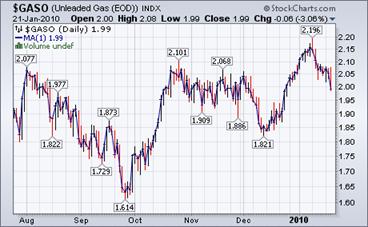 The Energy Information Agency weekly report suggests, “The U.S. average price for regular gasoline dropped a penny to $2.74 per gallon, $0.89 higher than the average a year ago. On a regional basis, price changes were mixed. The East Coast price of $2.75 per gallon moved up less than a penny, while the price in the Rocky Mountains jumped up four cents to $2.62 per gallon. The price on the Gulf Coast was essentially unchanged at $2.62 per gallon. Prices in the Midwest and on the West Coast dropped, moving down over a penny on the West Coast to $2.95 per gallon and dropping nearly five cents to $2.68 per gallon in the Midwest.”
The Energy Information Agency weekly report suggests, “The U.S. average price for regular gasoline dropped a penny to $2.74 per gallon, $0.89 higher than the average a year ago. On a regional basis, price changes were mixed. The East Coast price of $2.75 per gallon moved up less than a penny, while the price in the Rocky Mountains jumped up four cents to $2.62 per gallon. The price on the Gulf Coast was essentially unchanged at $2.62 per gallon. Prices in the Midwest and on the West Coast dropped, moving down over a penny on the West Coast to $2.95 per gallon and dropping nearly five cents to $2.68 per gallon in the Midwest.”
Frigid weather keeps NatGas prices high.
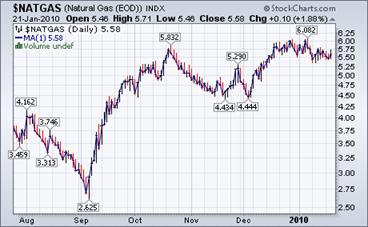 The Energy Information Agency’s Natural Gas Weekly Update reports, “As the extreme cold left much of the lower 48 States this week, natural gas demand for space heating and as a fuel for electric power plants fell precipitously. Compared with the prior report week, U.S. natural gas average daily demand decreased about 25 percent from 106 Bcf to 79 Bcf, according to Bentek Energy LLC. Lower demand led to widespread declines in prices that were generally less than 5 percent.”
The Energy Information Agency’s Natural Gas Weekly Update reports, “As the extreme cold left much of the lower 48 States this week, natural gas demand for space heating and as a fuel for electric power plants fell precipitously. Compared with the prior report week, U.S. natural gas average daily demand decreased about 25 percent from 106 Bcf to 79 Bcf, according to Bentek Energy LLC. Lower demand led to widespread declines in prices that were generally less than 5 percent.”
Joseph Stiglitz: 'We're More Strict With Our Poor Than With Our Banks'
During the economic turmoil of the last few years, Nobel Prize-winning economist and Columbia University professor Joseph Stiglitz has been one of the most strident and incisive critics of the historic bailout of the banking sector.
Never one to mince words, Stiglitz, who served as the Chief Economist at the World Bank and on President Clinton's Council of Economic Advisers, has said the meltdown has resulted in a kind of "ersatz capitalism" in America. He has also repeatedly called for a second round of fiscal stimulus to support struggling Americans. Read full article here.
Is The U.S. Economy Being Tanked By Mistake or By Intent?
Should American bankers be let off the hook because they self-declare, before an investigational panel, that the failure of their newly invented risk swaps and other highly leveraged investment schemes was simply due to "mistakes"? Not malfeasance – just every-day mistakes? Bankers just fell asleep at the helm at a critical juncture in American history. Is that what we are being led to believe?
Oh well, it’s just 18 million American homes that now lay empty in the wake of unprecedented foreclosures, and the bankers have collected obscene bonuses for reckless lending of their depositors’(and taxpayers’) money. It’s like the captain and crew of a ship saying, not to worry, twenty-percent of the passengers were lost overboard, but this was due to unavoidable mistakes, and then being rewarded with bonuses when they reach port.
Traders alert: The Practical Investor is currently offering the daily Inner Circle Newsletter to new subscribers. Contact us at tpi@thepracticalinvestor.com for a free sample newsletter and subscription information.
Our Investment Advisor Registration is on the Web
We are in the process of updating our website at www.thepracticalinvestor.com to have more information on our services. Log on and click on Advisor Registration to get more details.
If you are a client or wish to become one, please make an appointment to discuss our investment strategies by calling Connie or Tony at (517) 699-1554, ext 10 or 11. Or e-mail us at tpi@thepracticalinvestor.com .
Anthony M. Cherniawski,
President and CIO
http://www.thepracticalinvestor.com
As a State Registered Investment Advisor, The Practical Investor (TPI) manages private client investment portfolios using a proprietary investment strategy created by Chief Investment Officer Tony Cherniawski. Throughout 2000-01, when many investors felt the pain of double digit market losses, TPI successfully navigated the choppy investment waters, creating a profit for our private investment clients. With a focus on preserving assets and capitalizing on opportunities, TPI clients benefited greatly from the TPI strategies, allowing them to stay on track with their life goals
Disclaimer: The content in this article is written for educational and informational purposes only. There is no offer or recommendation to buy or sell any security and no information contained here should be interpreted or construed as investment advice. Do you own due diligence as the information in this article is the opinion of Anthony M. Cherniawski and subject to change without notice.
Anthony M. Cherniawski Archive |
© 2005-2022 http://www.MarketOracle.co.uk - The Market Oracle is a FREE Daily Financial Markets Analysis & Forecasting online publication.



